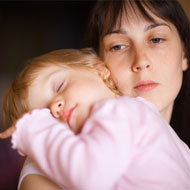Newborn Baby Sleeping Average Time & Signs
Sleep is absolutely essential for the development of the baby as it provides the body with adequate rest after nutritional intake. When the baby sleeps, it also means a break for the mother.
Initially, the baby would be sleeping for about 16 to 17 hours in day, including the naps during the day and sleeping at night. Babies are good at regulating their own sleep needs, although each baby may get different amounts of sleep.
Baby's Sleeping Hours
Baby's Sleeping Hours
An average one-month-old baby would sleep for about 5 to 6 hours in the daytime; at three months of age, they would sleep for about five hours. A one-year-old baby would take a 2.5-hour nap during the day. Sleeping times vary across cultures, and each baby is different. Most often breastfed babies and babies sleeping with other babies sleep for shorter periods than others.
It is found that adequate sleep is essential for the baby's brain development, and napping during the day improves the memory and helps in moving information to a more permanent place in the memory of the child. Napping helps children to rest well, and well-rested babies are found to be less fussy or cranky with longer attention spans. As the energy levels usually drops in the afternoon, it is best that babies nap at this time. It also helps them catch up with the sleep they might have missed the previous night.
Baby's Sleeping Schedule
A new born baby sleeping schedule will include short naps throughout the day as they are overwhelmed with their surroundings, but as they grow, their napping times develop a pattern. This makes it easier for the exhausted parent to rest and make plans.
It is best if the babies are put to nap after two hours of waking, after the midday meal, and in the early evening. If the sleep pattern is disturbed, they tend to become cranky. Babies can nap between 1 to 2 hours each time, although some babies tend to take shorter 45-minute naps. Baby sleeping patterns are unique to each baby and so you can keep a baby nap diary to figure out the exact patterns and try to ensure that their feeds follow a schedule accordingly.
Baby's Sleeping Signs
It is important that we recognize the baby's sleep signs, lest we ignore them and they become overtired and cranky. Babies that need sleep start rubbing their eyes; yawn; become slow, quieter, and fussy; want to be nurse or have the bottle; suck their thumbs; or reach for a sleep toy.
While most babies sleep once they are put down to nap, some babies do not. You might have to read a short book, play soft music, or rock the baby to sleep. You will soon recognize when your child needs a nap and can change the routine according to the activities of your baby.


